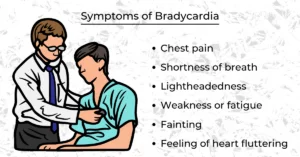
What is Bradycardia?
While it is normal for a healthy heart to beat slower while at rest, it should generally fall between 60 and 100 beats per minute. Anything below 60 beats per minute is described as bradycardia, or an abnormally slow heartbeat. A slow or irregular heartbeat can have a number of different causes and may not always be a serious issue, but could also point to an underlying heart problem that requires treatment.
What Are The Causes of Bradycardia?
Your heart has a naturally occurring electrical system which, when working properly, keeps it beating at a normal rate. Electrical impulses originate in the sinus node (SA node) and travel through the atria and ventricles, causing the heart to pump blood throughout the body. If there is a problem with the SA node or AV node (the node located between the atria and ventricles which regulates the impulse) or if the electrical signal is blocked (known as “heart block”) from reaching all the way to the ventricles, it can cause bradycardia.
Additionally, a slow heartbeat can be a sign of a congenital heart abnormality or damage to the heart tissue, either by heart disease, heart attack, or the natural process of aging. Inflammation affecting heart tissue, known as myocarditis, can also cause bradycardia, which means that inflammatory diseases like lupus can also contribute to the issue. Slowed heartbeat is a side effect of some medications, and can also sometimes be linked to hypothyroidism or obstructive sleep apnea.
What Are The Signs And Symptoms of Bradycardia?

Bradycardia does not always have noticeable symptoms. However, if your heart is not beating quickly enough, you may not be getting sufficient oxygen delivered to your brain and other parts of your body. This can cause symptoms like chest pain, shortness of breath, lightheadedness, weakness or fatigue (either general or brought on by physical activity), fainting, or the feeling of your heart fluttering or skipping a beat. Any of these symptoms should be reported to a cardiologist, especially if you have a personal or family history of heart problems.
In some cases, bradycardia can have mental effects such as confusion, brain fog, or memory problems.
What Are The Risk Factors of Bradycardia?
Bradycardia is most common among older adults due to weakening of heart tissue which occurs as we age. A previous heart attack or other event which causes damage to the heart also increases the likelihood of heartbeat irregularities. Any lifestyle habits which are harmful to the heart – smoking cigarettes, alcohol or opioid abuse, or high levels of stress – may have an impact on its ability to function properly. You may be at a higher risk of bradycardia if you have some conditions, like high blood pressure or obstructive sleep apnea.
How is Bradycardia Diagnosed?
Your doctor will evaluate your heart rate by testing your pulse and blood pressure. An electrocardiogram (EKG) will show irregularities in your heartbeat, but may not be definitive because bradycardia symptoms can come and go rather than being constant throughout the day. You may be asked to wear an ambulatory ECG monitor for 24 hours in order to evaluate heart function over a longer period. This may also help to determine whether any specific activities are contributing to irregular heart rhythms. An exercise stress test may be ordered to gauge the effect of physical activity on your heartbeat.
What Are Possible Treatments For Bradycardia?
As long as your organs are getting sufficient blood flow, a lowered heart rate isn’t necessarily a bad thing, and bradycardia without symptoms does not always need to be treated. If you have bradycardia caused by an issue with your heart’s electrical activity, a pacemaker may be installed to maintain a normal heartbeat. Treatments may also be prescribed to treat underlying causes such as thyroid imbalance or sleep apnea. Your doctor may also recommend changing or ceasing use of certain medications.
Are There Preventative Steps or Measures To Avoid Bradycardia?
A heart healthy lifestyle – eating right, getting enough exercise, avoiding cigarettes and alcohol, reducing stress, and managing any existing cardiovascular issues such as heart disease, cholesterol, or high blood pressure – is key to preventing heart tissue damage that can contribute to an abnormal heartbeat. Make sure that you are getting regular medical checkups and inform your doctor if you notice any new symptoms.
What Are The Risks If Bradycardia Is Left Untreated?
While a slow heart rhythm is not always a serious health issue, ignoring bradycardia can lead to new or worsening symptoms, such as increased chest pain and chronic fatigue. If not addressed over the long term, an abnormal heartbeat increases your risk of cardiac arrest, which can lead to serious complications including death.
Are There Other Related Conditions To Bradycardia?
Bradycardia can be caused by any condition that causes damage to heart tissue, including heart disease and heart attack. Abnormal blood flow can also be linked to high blood pressure and sleep apnea.
Key Takeaways About Bradycardia (Top 3-5 points to remember from everything)
Bradycardia is a slow or irregular heartbeat, usually defined as a pulse that is under 60 beats per minute. Low heart rate is not always a problem and may be present without any noticeable symptoms, but it may also prevent the brain and other organs from getting enough oxygen. When this happens, you may feel fatigued, dizzy, or lightheaded, or experience cardiac symptoms like chest pain. If bradycardia is caused by a problem with the electrical impulses in your heart, a pacemaker may need to be installed to correct the issue. Other treatments include lifestyle changes and medical interventions for related conditions like sleep apnea or hypothyroidism.





